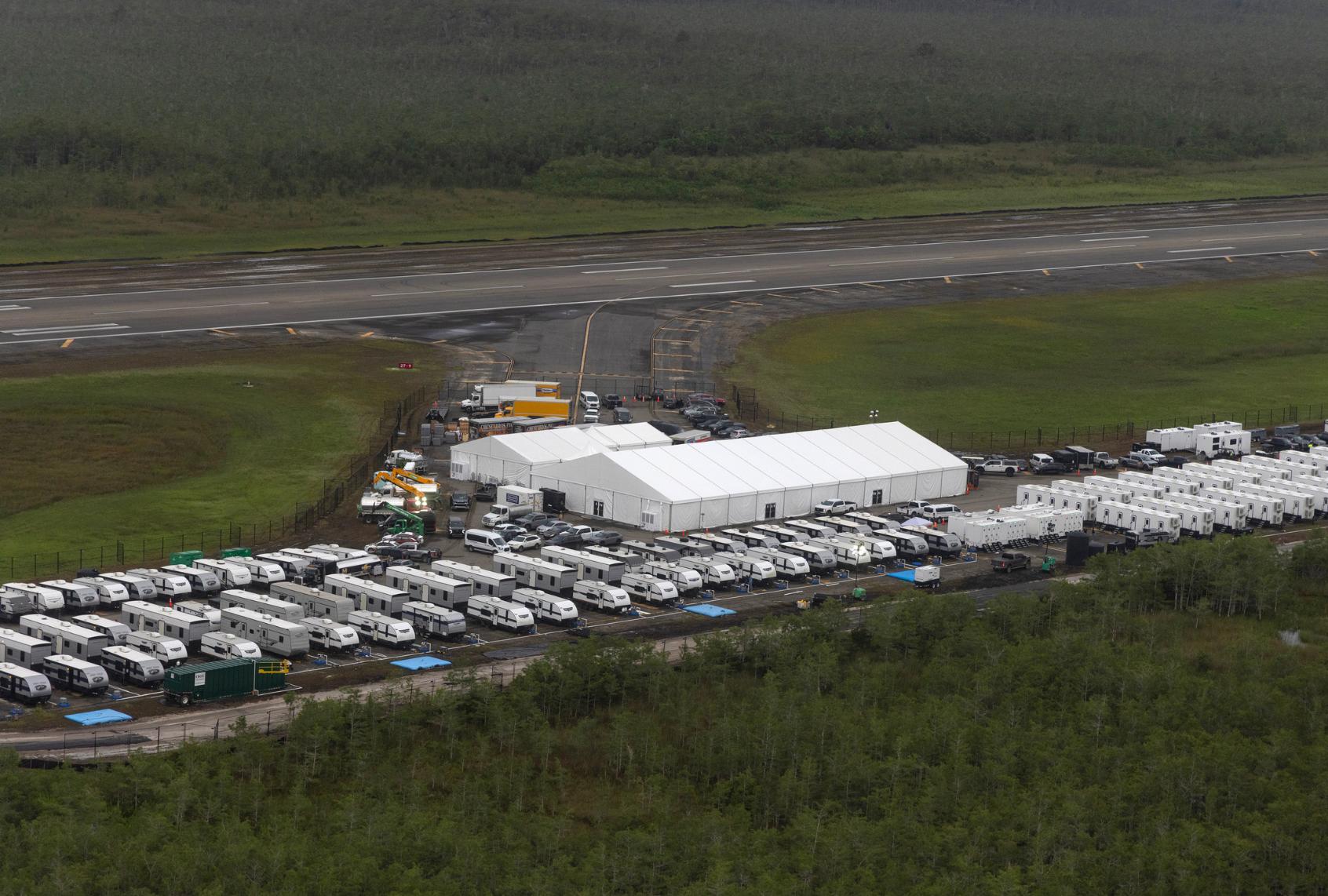In the sweltering Florida Everglades, surrounded by marshland teeming with alligators and accessible only by a narrow, winding road, lies a facility that’s become a flashpoint in the state’s escalating immigration crackdown. Officially designated as a detention center for immigrants — both documented and undocumented — this remote site has earned a notorious nickname: “Alligator Alcatraz.”
Critics say the facility’s name fits its grim reality. They argue it’s less a temporary holding site and more a punitive, secretive detention camp where detainees face extreme heat, overcrowded conditions, limited legal access and virtually no transparency. Rep. Michele Rayner, D-Fla., a civil rights attorney and vocal critic of the state’s immigration policies, recently toured the site and spoke candidly about what she witnessed and what those conditions say about Florida’s treatment of migrants.
Denied entry, then an exclusive tour
Rayner and four fellow Florida lawmakers first attempted an unannounced visit on July 3 — just two days after former President Donald Trump’s visit with Department of Homeland Security Secretary Kristi Noem. Despite state law granting them the right to inspect such facilities without notice, they were summarily denied entry, told “safety concerns” prevented their visit.
Rayner called out the contradiction: “The president was here. Was it safe for him but not for us?”
After a persistent back-and-forth, the group was offered a “sanitized” tour on July 12, 2025. Rayner called it a “dog and pony show,” noting officials showed them clean linens, box meals and orange jumpsuits, while refusing any contact with detainees or the ability to verify allegations of flooding and infrequent meals. The lawmakers were physically blocked from certain areas, and repeated questions about detainee treatment and legal access went unanswered.
Yellow bands and minor offenses
One of Rayner’s most striking observations: though the state claims the facility is for the “worst of the worst,” most detainees she saw wore yellow wristbands, designating them as the lowest-risk category, typically used for minor infractions like traffic violations. She described seeing people held on civil traffic offenses and hearing reports from her colleagues in Congress of American citizens and those with protected status among detainees.
“The facility is supposed to house serious felons,” Rayner said. “Instead, many are here for minor, often non-criminal reasons. It’s deeply troubling that people are being detained without clear legal justification or access to counsel.”
We reported previously that a Miami Herald investigation, highlighting cases such as a 15‑year‑old boy with no conviction and a man detained after a routine traffic stop, echoing Rayner’s central warning: this remote facility isn’t housing violent criminals, but rather vulnerable individuals wrongly blocked from basic legal protections.
Rayner also noted that there was no official, private place for attorneys to meet with their clients. “Only a corner of a cage,” she said, “monitored by a camera — violating attorney-client privilege and multiple laws.”
We need your help to stay independent
What oversight exists for this facility — and is it enough?
Rayner explained that oversight is minimal and fragmented. “Multiple agencies are involved — state Department of Corrections, local law enforcement and private contractors. But no single body is fully accountable. ICE involvement is murky. The lack of transparency makes meaningful oversight almost impossible.”
She called for independent investigations and federal scrutiny. “Without outside eyes, abuses will continue unchecked,” she said. “This facility operates in the shadows, and that’s unacceptable in a democracy.”
The nickname — and why she resists it
While “Alligator Alcatraz” has gained popularity among activists and media, Rayner herself rejects the term, wary of GOP attempts to trivialize the facility.
“I refuse to buy into Republican propaganda,” she said. “They’ve turned this into a tourist attraction with merchandise. Selling T-shirts and souvenirs. This isn’t a theme park. It’s a modern concentration camp, plain and simple.”
She underscored the symbolism behind the “Alcatraz” comparison: an infamous prison known for harsh treatment and isolation, surrounded by deadly waters. “The state claims alligators and pythons provide security,” Rayner noted. “But no animal deterrent can justify the cruelty inside.”
Start your day with essential news from Salon.
Sign up for our free morning newsletter, Crash Course.
What can people do?
Rayner’s message to Floridians and the broader public is clear: complacency is not an option. She urges residents to get informed, stay engaged and hold elected officials accountable.
“Keep your citizenship paperwork handy, memorize emergency contacts, and reach out to your lawmakers,” she said. “Organize, mobilize and vote. If your representative supports these abuses, replace them. Democracy depends on pressure from the people.”
She remains optimistic despite the uphill battle. “I’m never losing hope,” Rayner said. “Pressure bursts pipes. We must keep shining light on these abuses until justice prevails.”
Read more
about mass deportations


